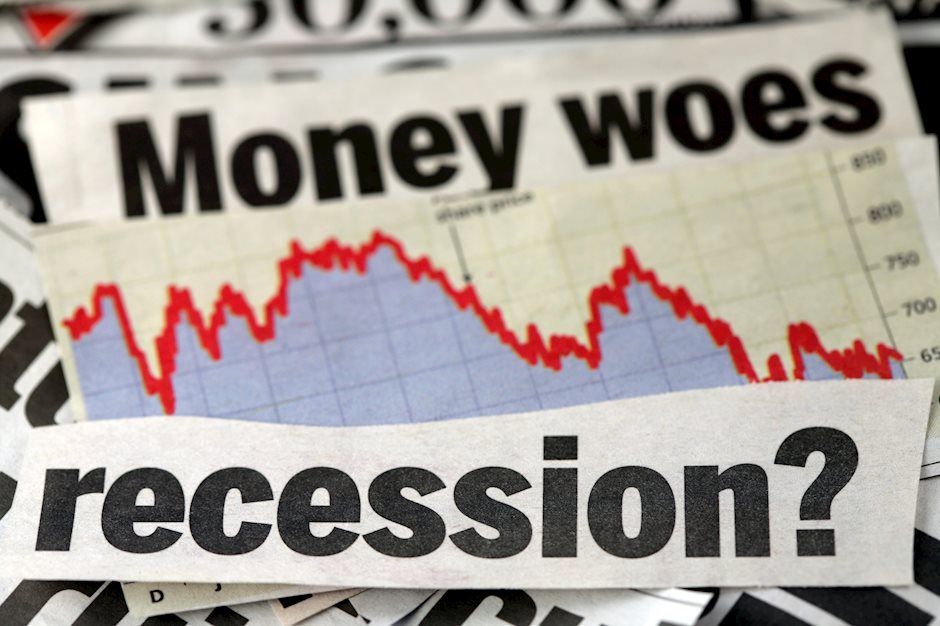What will happen to Bitcoin in a recession?

Bitcoin was launched in 2009 in response to the Great Financial Crisis and the global recession in 2008. It was initially designed as a decentralized payment system that didn't depend on banks that required government bailouts at the expense of the U.S. taxpayer.
As a result, bitcoin hasn't really faced the test of a full-blown recession. The National Bureau of Economic Research, which is tasked with officially determining whether a recession occurred, ruled last year that a recession occurred in 2020 with the start of the pandemic.
Bitcoin's first "recession"
According to the NBER, the COVID-19 recession started in February 2020 and lasted until April. The recession was marked by an eye-watering 31.4% plunge in the GDP during the second quarter. However, it also saw a massive snapback in the third quarter due to unprecedented monetary stimulus, which boosted output by 33.4%.
At two months, the pandemic-era recession was the shortest in U.S. history. The bitcoin price dipped in early 2020, but the recession was over so quickly that the cryptocurrency didn't really see any profound impact from it. As a result, we have no idea how bitcoin will respond to a typical recession, particularly one that lasts for an extended period, as some market watchers are predicting now.
A growing number of market analysts are addressing the widespread concerns about a recession. For example, Citi analysts estimate an almost 50% probability of a global recession in the near future, while Goldman Sachs analysts said equities are already pricing in a "mild" recession.
The Financial Times surveyed 49 economists recently and found that almost 70% of them are expecting a recession in the U.S. next year due to the Federal Reserve's hawkish policies. Even Fed Chair Jerome Powell himself warned recently that engineering a soft landing would be challenging, adding that their hawkish attempts to rein in inflation could result in a recession.
Defining a recession
From a traditional and technical standpoint, a recession occurs when an economy's GDP slips into the negative while unemployment rises, retail sales fall, and manufacturing output declines. Generally, this economic decline must last for at least two straight quarters.
This is why some might argue that the 2020 recession didn't qualify as one, although its February-to-April timeline did span parts of two quarters. Since bitcoin has only been around since 2009, it lacks the history that would enable us to predict what it will do during a recession.
Typically, recessions cause investors to seek safe-haven assets like gold or the dollar. Currently, gold is holding up well but not skyrocketing, and the dollar remains relatively strong, which is probably why gold hasn't taken off yet.
What to buy during a recession
Recessions generally aren't a good time to buy stocks, but some will do better than others. Sectors like energy, utilities, financials, industrials and consumer staples tend to hold up better than sectors like consumer discretionary and technology.
However, investors should keep in mind that a bear market is really the best time to buy stocks that will stand the test of time because prices are low. The trade-off is that the money will be locked up for an extended period because those stocks probably won't rally until the bear market ends and recovery begins.
So what does all this mean for bitcoin? It's been clear for years that bitcoin is a highly speculative asset. More recently, the cryptocurrency has displayed a close, positive correlation with stocks, particularly tech stocks.
This trend suggests that bitcoin may not be as recession-resistant as crypto enthusiasts have long expected it to be. Rather than "digital gold," bitcoin is behaving more like a tech stock. In fact, bitcoin's plunge proves that it lacks the safe-haven status that's been granted to actual gold.
Predicting Bitcoin's price
Of course, every crypto fan wants to know when bitcoin will bottom out. After all, every investor dreams of buying at the very bottom of the market, but history shows that it's impossible to time the market successfully, no matter which market you're talking about. However, that won't keep people from trying.
Cointelegraph pulled together commentary from multiple sources suggesting that bitcoin's bottom is close or just recently past. For example, the site called attention to a tweet from David Puell of Cathie Wood's ARK Invest. He pointed to some numbers that suggest the bitcoin market might not be as bearish as is widely believed.
Puell looked at the cost basis for long- and short-term holders and found that those who have held bitcoin longer paid less in aggregate for their bitcoin than those who bought theirs recently. As a result, short-term holders are feeling the pain of bitcoin's plunge more than long-term holders.
Has Bitcoin bottomed out?
Of course, even without the math, his statement is clear because anyone who bought bitcoin toward the end of last year or early this year has lost a sizable chunk of change on their trade. Hopefully, they're HODLing (holding on for dear life) tightly in hopes that the cryptocurrency will reach the price they paid again.
At any rate, well-known analyst Root responded to Puell's tweet by saying that he sees a "high likelihood we either had or are really close to a bottom." Cointelegraph also called attention to the well-known on-chain metric called the Mayer Multiple.
The indicator shows how far bitcoin's price is below its 200-day moving average. On June 22, it displayed a reading of 50% below the 200-day moving average, a level it has only been at during 2% of the cryptocurrency's lifetime.
Crypto entrepreneur Kyle Chasse noted that macroeconomic conditions are different this time around, but he believes it would be a good idea to keep an eye on the indicator.
Wishful thinking?
Chasse's point about macro conditions is critical. These are unprecedented times, and bitcoin is still a relatively new asset class. The fact that bitcoin is being affected by non-crypto macro factors suggests that it is finally maturing and that institutional investors are becoming comfortable with it.
Edward Moya of OANDA said in an email on Wednesday that a consolidation could be just around the corner for bitcoin because he believed the challenging macro environment was close to being fully priced in. However, on Thursday, the story was a little different.
"Bitcoin's longer-term outlook is for much higher prices, but no one is confident that the bottom is in place," Moya concluded. "Bitcoin will remain a volatile trade, and the correlation with equities seems like it will last for quite a while."
He also noted that bitcoin was holding around $20,000 as Wall Street tried to figure out how aggressive the Fed would be in fighting inflation. However, he added that bitcoin remains a risky asset and doesn't expect it to trade on crypto-related fundamentals until U.S. stocks reach a "firm bottom."
In short, the "experts" don't actually know and can't know where the bottom will be for bitcoin. As with any investment you expect to recover, it might be wise to hold on until it rallies. After all, bear markets usually offer the lowest asset prices, but the key is to choose assets that will come back when the market rights itself.
Author

Jacob Wolinsky
ValueWalk
Jacob Wolinsky is the founder of ValueWalk, a popular investment site. Prior to founding ValueWalk, Jacob worked as an equity analyst for value research firm and as a freelance writer. He lives in Passaic New Jersey with his wife and four children.





